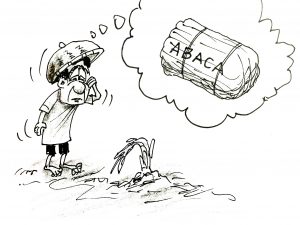Once flourishing and a major player in the global market, the abaca industry in the Philippines has experienced significant changes as time passed by. Derived from the abaca plant which is native to the country, abaca has had a rich history in our country, as it was primarily used for making ropes, textiles, and other handicrafts. However, the abaca industry has faced several challenges, causing its decline in recent years.
One major factor that has affected the abaca industry in our country is the shift in global demand for natural fibers. In the past, abaca was highly sought after for its strength and quality, making it a valuable export commodity. However, with the emergence of synthetic fibers and the development of more cost-effective alternatives, the demand for abaca has decreased. This has caused a decline in both production and exportation, negatively impacting the industry’s growth and profitability.
Climate change has also posed a significant threat to our abaca industry. The abaca plant requires specific environmental conditions, such as high humidity and well-distributed rainfall, to thrive. However, global warming and changing weather patterns have disrupted these conditions, leading to a decrease in abaca yields. Extreme weather events, such as typhoons, have become more frequent and severe, causing extensive damage to abaca plantations and affecting the livelihoods of farmers.
The emergence of synthetic alternatives has also contributed to the decline of the abaca industry in the Philippines. Synthetic fibers can be produced at a lower cost, are readily available, and often offer comparable or superior properties to abaca. As a result, the demand for abaca-based products, such as ropes and textiles, has been replaced by cheaper synthetic alternatives in various industries. This shift in consumer preference has significantly impacted the market for abaca, leading to a decline in the industry’s overall growth.
Our abaca industry has then faced numerous challenges that have hindered its growth and profitability. The government and industry stakeholders must implement sustainable measures, such as diversifying product offerings, promoting green technologies, and supporting farmers in adapting to climate change. With these, the abaca industry may still reclaim its position as a vital player in the global market and contribute to the country’s economic development.




